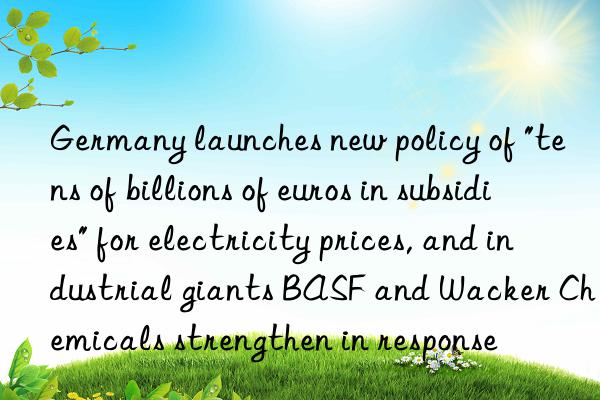
After months of pulling and pulling, the German coalition government finally reached an agreement on an important policy to boost the manufacturing industry-electricity price subsidies. This development has also been generally welcomed by German industry and stock investors.
Boosted by this policy, German chemical giants BASF and Wacker Chemicals both rose and strengthened during the session, eventually closing up more than 2% and 3% respectively.
Electricity price “tens of billions of subsidies” released
According to an announcement released on the official website of the German government, Chancellor Scholz, Economy Minister Habeck and Finance Minister Lindner, representing the three parties of the coalition government, reached an agreement on Thursday toprovide additional funding to German companies in the next five years. Supportive policies, especially electricity-intensive manufacturing companies will benefit from the new electricity price subsidy package.
Scholz also said in the statement that the German government is "significantly reducing electricity bills" and continuing to provide electricity price compensation, with the purpose of allowing companies to better cope with the current electricity price environment. The German Prime Minister stated concisely and concisely that in 2024 alone, this series of support policies will reduce the burden of 12 billion euros on German companies.
The German government stated in the document that the newly introduced package of electricity price support policies includes:
Germany's electricity tax will be reduced to the lowest level allowed in the EU, from the current 15.37 euros/MWh to 0.5 euros/MWh.
For 350 energy-intensive enterprises that "face the most intense international competition", extend the existing carbon emission cost subsidies for electricity and remove the restriction of "no subsidy for the first GWh";
Extend the carbon emission cost cap measures for nearly 90 specific companies. This policy limits the price companies pay for carbon emissions to a certain percentage of the added value of production.
Germany currently does not have a single industrial electricity price standard, but as a reference, the cost of electricity for German residents in 2023 will be about 45 cents/kWh, which is also one of the most expensive in Europe. Due to a series of tax exemptions and subsidy policies, the cost of electricity for energy-intensive enterprises in Germany will be significantly lower than the electricity price for residents.
Due to the impact of electricity costs and the international economic situation, Germany's economic growth has been roughly stagnant for more than a year, and the manufacturing PMI has been roughly below the "prosperity and contraction line" since the beginning of the year.
German industry generally welcomesDiscussions about this policy have actually been going on for several months. Habeck of the Green Party called for heavy subsidies to help energy-intensive companies control electricity price expenditures, but the Free Democratic Party (Lindner), who prefers a free market economy, and Chancellor Scholz had different views and could not reach an agreement until this week.
Lindner said in a statement on Thursday that by comprehensively reducing the burden on energy-intensive production enterprises, the government has adopted a market-dependent approach... The electricity price plan is to lead the German economy on the path to sustainable success. another cornerstone.
Regarding this new policy, the German industry generally expressed joy. German energy and water industry group BDEW expressed appreciation for the government not imposing fixed electricity prices. "We need price signals from the market to invest in energy efficiency and renewable energy while promoting the transformation of industrial processes," said Kerstin Andreae, the organization's director.
The Family Business Association (Familienunternehmer), a lobby group representing large family businesses, called today's policy a "victory for common sense" and said "this is how government policy benefits the entire economy".
The German Mining, Chemical and Energy Industry Association (IG BCE) expressed support while also asking the government to "go further". The association said it was an "important first step" but that the measures were not enough to achieve sustainable reductions in electricity prices for companies facing international competition. The German Chemical Industry Association VCI also stated that this measure only solved a small part of the problems faced by the industry and did not provide more help in improving international competitiveness.
As a "minority" with a more obvious critical attitude, the environmental organization Greenpeace believes that this new policy weakens the motivation to reduce energy consumption and emission reductions, and calls on the government to provide targeted support to companies that proactively carry out energy-saving transformation.



 微信扫一扫打赏
微信扫一扫打赏
